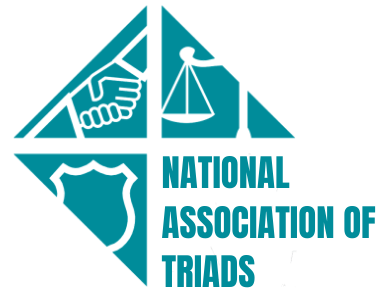National Association of Triads
About NAT | Starting a Triad | Locate a Triad | Resources | Triad Newsletter | Links
NEW RESOURCE: National Association of Triads Reference Guide
This resource was designed to give a brief overview of the triad program, its benefits, and other facts & figures.
WEBINAR: Safeguarding Seniors from Scams
Older adults lose billions each year from financial exploitation and it’s getting worse. With 10,000 Baby Boomers turning 65 years old every day, scammers are working overtime to manipulate seniors. The impact often extends beyond finances. Financially exploited seniors often suffer emotional consequences and even physical ramifications. Yet, elder financial abuse can be prevented. Knowledge is key to prevention and partnerships are vital to protecting seniors. Tune in to hear from Sam Kunjukunju at the American Bankers Association Foundation to talk about prevailing frauds and ways you can help protect elders in your community.
PRESENTER:
Samuel Kunjukunju, Senior Director, Bank Community Engagement, American Bankers Association
Recorded May 24, 2022
WEBINAR: Understanding the Challenges That Affect the Older Adult for Law Enforcers
This seminar addresses the physical and cognitive changes that affect older adults and the age-related risk factors which are why seniors are the “age group of choice” of most scam artists. This seminar heightens awareness for law enforcers about how to work with the specific needs and challenges that older adults face due to ailments commonly associated with aging. It also addresses why these challenges affect their vulnerability to the various types of elder abuse.
PRESENTER:
Angela Deleon, Crime Prevention Specialist
Recorded May 26, 2021
Partnership
 The purpose of Triad is to promote older adult safety and to reduce the fear of crime that older adults often experience. Triad assists at the grassroots level, helping you organize your Triad and providing a clearinghouse of programs and resources that can be implemented at a community level, and training materials for law enforcement, volunteers, and community groups.
The purpose of Triad is to promote older adult safety and to reduce the fear of crime that older adults often experience. Triad assists at the grassroots level, helping you organize your Triad and providing a clearinghouse of programs and resources that can be implemented at a community level, and training materials for law enforcement, volunteers, and community groups.What Triads do:
-
Educate: by sponsoring crime prevention and public education for older adults.
-
Assist: by recruiting and training volunteers to assist sheriff's offices, police departments, and other agencies.
-
Support: by identifying community resources and providing referrals to older persons to help reduce fear and lend moral support.
The National Association of Triads Quarterly Newsletter
A monthly newsletter of articles geared towards reducing criminal victimization of older persons and improving quality of life for older adults.
View Previous Issues:
- 2021 Q1 Newsletter
- 2021 Q2 Newsletter
- 2021 Q3 Newsletter
- 2021 Q4 Newsletter
- 2022 Q1 Newsletter
- 2022 Q2 Newsletter
- 2022 Q3 Newsletter
- 2022 Q4 Newsletter
For general comments and questions about National Association of Triads contact us at:
Tel: 703.836.7827 | Fax: 703.838.5349 | Email: kbarksdale@sheriffs.org
This project was supported, in whole or in part, by cooperative agreement number 2020CKWX0039, awarded by the U.S. Department of Justice, Office of Community Oriented Policing Services. The opinions contained herein are those of the author(s) or contributor(s) and do not necessarily represent the official position or policies of the U.S. Department of Justice. References to specific individuals, agencies, companies, products, or services should not be considered an endorsement by the author(s) or the U.S. Department of Justice. Rather, the references are illustrations to supplement discussion of the issues.



